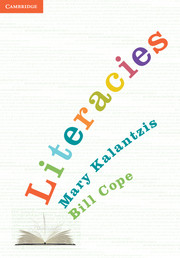Book contents
- Frontmatter
- Contents
- Acknowledgements
- Introduction The work of learning and teaching literacies
- Part A The ‘Why’ of Literacies
- Chapter 1 Literacies on a human scale
- Chapter 2 The purposes of literacies
- Part B Approaches to Literacies
- Part C The ‘What’ of Literacies
- Part D The ‘How’ of Literacies
- References
- Index
Chapter 2 - The purposes of literacies
from Part A - The ‘Why’ of Literacies
- Frontmatter
- Contents
- Acknowledgements
- Introduction The work of learning and teaching literacies
- Part A The ‘Why’ of Literacies
- Chapter 1 Literacies on a human scale
- Chapter 2 The purposes of literacies
- Part B Approaches to Literacies
- Part C The ‘What’ of Literacies
- Part D The ‘How’ of Literacies
- References
- Index
Summary
Overview
In this chapter, we take a look at the contemporary social changes mentioned in the previous chapter, including the changing purposes of literacies in everyday life. One of the primary functions of schools is to prepare learners for this ‘real world’ of communication – for work, citizenship and contemporary community life.
Why literacies?
Literacies and opportunity
Why ‘literacies’? Or even more fundamentally, why education – in which literacy is considered to be one of the ‘basics’?
Education provides access to opportunities in the form of better-paid employment , an improved chance to participate in civic life and personal growth. It also promises deeper understandings of the world, enabling people to do more for themselves and make a contribution to the lives of others. Literacies are central to these fundamental educational objectives.
Education is a key site of social opportunity, even if the scales of opportunity are often unevenly balanced. Equity is a value that matters in a fair society, a principle that requires equivalent opportunities to be available to all, irrespective of their social origins or cultural background. A more ambitious goal of education may be for it to contribute to greater equality. Sometimes, all that it seems to achieve is an ongoing struggle to reduce the gap between the haves and the have-nots – hence, for example, the compensatory literacy programs, the remedial reading programs for children who have been ‘left behind’ and the special efforts made in schools in poor neighbourhoods.
- Type
- Chapter
- Information
- Literacies , pp. 41 - 60Publisher: Cambridge University PressPrint publication year: 2012



